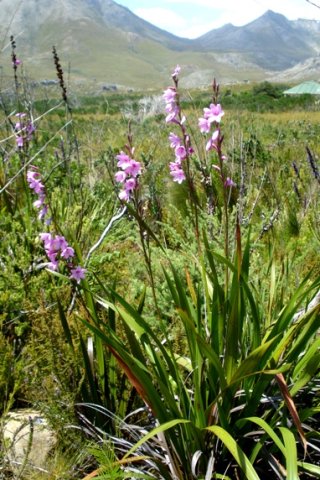Watsonia borbonica subsp. borbonica leaves

Author: Ivan Lätti
Photographer: Judd Kirkel Welwitch
The apple-green leaves of Watsonia borbonica subsp. borbonica are sword-shaped, firm and glossy. Leaf dimensions vary between 50 cm and 70 cm in length by 2 cm and 4 cm in width. Leaf length is between one third and two thirds of flower stalk height.
The specific name of this plant, borbonica, comes from an accident of knowledge loss:
In the early days of the Cape Colony many exciting and unknown plants were collected from there for transportation by ship returning to Europe where botanists eagerly awaited consignments from this and other parts of the world, sometimes all arriving on the same ship. This material generated much activity, ranging from studying, growing, describing and naming the newly discovered plants, to organising exploration expeditions, some of which are well documented.
During these long sea voyages cargo sometimes had to be moved, became interfered with by sailors or storms tossed them about randomly, sometimes dramatically. This caused the occasional mix-up of plant specimens on board. W. borbonica specimens landed in Europe safely, but were mixed up with plants from the island of Réunion, then called Ile de Bourbon. The plant was named W. borbonica for its putative origin.
This was not the only misnomer of this nature. It also happened (at least) to Aloe succotrina, thought for a time to have originated from another island, Socotra.
Thus human knowledge grows from persevering with continual corrections and reviews to counter human error, counting on repetitions not falling foul of misleading contingencies and event probabilities. Our history is a litany of human frailty and ignorance, interspersed with breakthrough and achievement. That is what we have, what we work with, who we are (Manning, 2007; Bean and Johns, 2005; iNaturalist; Wikipedia; www.plantzafrica.com).

